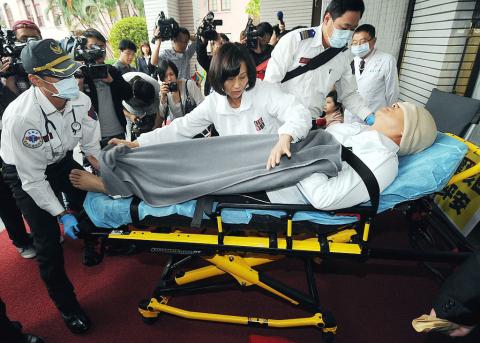Chinese Nationalist Party (KMT) Legislator Lin Yu-fang (林郁方) said that the Fourth Nuclear Power Plant in New Taipei City’s Gongliao District (貢寮) “would be refrigerated permanently without any need for a referendum” for as long as electricity was in good supply.
The KMT’s resolution on the facility was reached in a party meeting on Thursday night, with the “refrigeration” decision — which means the plant is left without fuel rods inserted and thus unactivated — called by many a “concession” by President Ma Ying-jeou’s (馬英九) administration.
The resolution was based on Lin’s proposal who yesterday morning said the facility should be “sealed up” and its future use left open, “so that if one day there is a shortage of electricity, the plant’s activation would still be a viable option.”

Photo: Fang Pin-chao, Taipei Times
“If there is no such shortage, as anti-nuclear activists claim, then they don’t have to worry about a possible referendum or an activation,” he said, adding that the facility should not be scrapped “because you’re not God or a prophet, so you cannot foresee whether there will be plenty of electricity in the future.”
When asked about Taiwan Power Co’s (Taipower) contribution to a report in the Chinese-language United Daily News about the costs involved in sealing the plant and a subsequent activation, Lin said that Taipower “is in no position to have a say in this discussion.”
“They have changed their statements too often for the public to trust them,” Lin said.
The state-owned entity did not actually give precise figures in the report.
He also commented on the existing referendum threshold stipulated under the Referendum Act (公民投票法).
“I have to agree with the Democratic Progressive Party [DPP] about the threshold being too high,” Lin said, adding that referendums could be differentiated into two kinds: one type pertaining to national identity and security, which would require a higher threshold, and another to people’s livelihood.
Meanwhile, KMT party caucus whip Lin Hung-chih (林鴻池) said he was not so sure about Lin Yu-fang’s “no shortage, no referendum” dictum.
In a press conference yesterday, Lin Hung-chih, when asked about the schedule for a potential referendum, said that the referendum is to take place after the plant’s completion and a safety check, with dates unspecified, according to the KMT’s resolution.
Saying the aim of the resolution is to “allow the public to have enough time to deliberate and to think it through,” Lin Hung-chih did not make affirmative response on Lin Yu-fang’s promise of “sealing-up” the plant.
Meanwhile, DPP Legislator Chen Ou-po (陳歐珀), who accompanied former DPP chairman Lin I-hsiung (林義雄) on his hunger strike and mute protest on Tuesday, passed out yesterday morning due to low blood sugar levels and high blood pressure.
Chen had been expected to speak at the national-affairs forum on the legislative floor, where lawmakers were to voice their concerns over government policies.
Instead of speaking, he held up for the whole three-minute session assigned for each registered lawmaker a banner that read: “Stop the Fourth Nuclear Power Plant’s construction to ensure [our] safety.”
The lawmaker then reportedly collapsed suddenly when he returned to his sit-in position outside the chamber and was immediately taken to National Taiwan University Hospital.

Alain Robert, known as the "French Spider-Man," praised Alex Honnold as exceptionally well-prepared after the US climber completed a free solo ascent of Taipei 101 yesterday. Robert said Honnold's ascent of the 508m-tall skyscraper in just more than one-and-a-half hours without using safety ropes or equipment was a remarkable achievement. "This is my life," he said in an interview conducted in French, adding that he liked the feeling of being "on the edge of danger." The 63-year-old Frenchman climbed Taipei 101 using ropes in December 2004, taking about four hours to reach the top. On a one-to-10 scale of difficulty, Robert said Taipei 101

Nipah virus infection is to be officially listed as a category 5 notifiable infectious disease in Taiwan in March, while clinical treatment guidelines are being formulated, the Centers for Disease Control (CDC) said yesterday. With Nipah infections being reported in other countries and considering its relatively high fatality rate, the centers on Jan. 16 announced that it would be listed as a notifiable infectious disease to bolster the nation’s systematic early warning system and increase public awareness, the CDC said. Bangladesh reported four fatal cases last year in separate districts, with three linked to raw date palm sap consumption, CDC Epidemic Intelligence

US climber Alex Honnold left Taiwan this morning a day after completing a free-solo ascent of Taipei 101, a feat that drew cheers from onlookers and gained widespread international attention. Honnold yesterday scaled the 101-story skyscraper without a rope or safety harness. The climb — the highest urban free-solo ascent ever attempted — took just more than 90 minutes and was streamed live on Netflix. It was covered by major international news outlets including CNN, the New York Times, the Guardian and the Wall Street Journal. As Honnold prepared to leave Taiwan today, he attracted a crowd when he and his wife, Sanni,

Taiwanese and US defense groups are collaborating to introduce deployable, semi-autonomous manufacturing systems for drones and components in a boost to the nation’s supply chain resilience. Taiwan’s G-Tech Optroelectronics Corp subsidiary GTOC and the US’ Aerkomm Inc on Friday announced an agreement with fellow US-based Firestorm Lab to adopt the latter’s xCell, a technology featuring 3D printers fitted in 6.1m container units. The systems enable aerial platforms and parts to be produced in high volumes from dispersed nodes capable of rapid redeployment, to minimize the risk of enemy strikes and to meet field requirements, they said. Firestorm chief technology officer Ian Muceus said